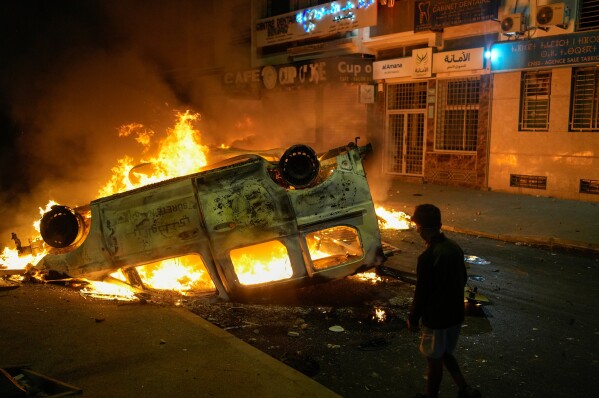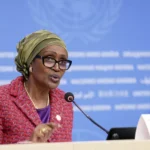At least two people have been killed in Morocco after police opened fire to stop protesters from storming a police station in the town of Lqliaa, near the coastal city of Agadir, according to state media. These fatalities mark the first reported deaths since large-scale youth-led demonstrations, known as the Gen Z protests, erupted across the country last weekend.
The unrest, driven primarily by Morocco’s younger generation, has been fueled by mounting frustration over poor public services, corruption, and the government’s decision to channel billions of dollars into building stadiums for the 2030 FIFA World Cup while hospitals, schools, and employment opportunities remain inadequate. Demonstrators have popularized chants such as “Stadiums are here, but where are the hospitals?” to highlight what they see as the government’s misplaced priorities.
One protester from the eastern city of Oujda described the local hospital as “a jail,” claiming that patients are forced to bribe staff just to see a doctor. Speaking anonymously for fear of reprisals, he said conditions inside the facility were filthy and inhumane, reinforcing why many young Moroccans feel abandoned by the state.
While the protests have been largely peaceful, clashes with security forces have escalated at night in several cities. On Wednesday evening, police reported that they were “forced to open fire in legitimate self-defence” when demonstrators attempted to overrun the Lqliaa police station. State media confirmed that two people died in the confrontation.
The youth-led protest movement, calling itself GenZ 212—a reference to Morocco’s international dialing code—has distanced itself from violent incidents. The loosely organized group, which mobilizes through social media without formal leadership, insists its aim is to demand better health care, education, job opportunities, and accountability from the government, not to promote rioting.
Morocco’s economic crisis remains at the heart of the discontent. Official figures show unemployment at 12.8%, with youth unemployment at a staggering 35.8% and nearly one in five graduates unable to find work. For many young Moroccans, these statistics underscore deep systemic inequalities and fuel resentment against a government perceived as prioritizing international prestige projects, like the World Cup, over citizens’ urgent needs.
The protests have spread across major cities, including the capital Rabat, the economic hub Casablanca, and the northern port city of Tangier, which serves as a gateway for tourists arriving from Spain. Marrakesh, one of Morocco’s top tourist destinations, also saw violent clashes, with local media reporting that a police station was set on fire by demonstrators.
Authorities say the unrest has taken a heavy toll on both protesters and security personnel. According to Interior Ministry spokesman Rachid El Khalfi, more than 260 police officers and 20 protesters have been injured. In addition, 409 people have been detained nationwide, while 40 police vehicles and 20 private cars have been torched during the violence.
The Moroccan government has attempted to balance condemnation of the violence with an appeal for dialogue. The ruling coalition released a statement expressing willingness to engage directly with the country’s youth “within institutions and public spaces to find realistic solutions.” It also praised what it described as the “balanced reaction of security authorities in line with relevant legal procedures.”
The Moroccan uprising mirrors a wave of youth-led protests seen globally in recent months. Demonstrations in Nepal, Indonesia, the Philippines, and Madagascar have highlighted how economic frustrations, inequality, and disillusionment with political elites are sparking generational movements worldwide. In Nepal, such protests forced the resignation of the prime minister, while Madagascar’s president dissolved his government earlier this week in response to mass demonstrations.
For Morocco, however, the stakes are uniquely high as the government faces mounting pressure to prove that it can deliver meaningful reforms while preparing to host the FIFA World Cup in 2030. With tensions escalating and casualties now reported, the challenge for authorities is to find a balance between maintaining order and addressing the legitimate grievances of a restless generation that feels left behind.













Leave a comment